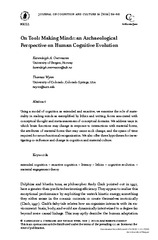| dc.contributor.author | Overmann, Karenleigh Anne | |
| dc.contributor.author | Wynn, Thomas | |
| dc.date.accessioned | 2020-07-03T07:11:37Z | |
| dc.date.available | 2020-07-03T07:11:37Z | |
| dc.date.issued | 2019 | |
| dc.Published | Overmann KA, Wynn T. On tools making minds: An archaeological perspective on human cognitive evolution. Journal of Cognition and Culture. 2019;19(1-2):39-58 | eng |
| dc.identifier.issn | 1567-7095 | |
| dc.identifier.issn | 1568-5373 | |
| dc.identifier.uri | https://hdl.handle.net/1956/23288 | |
| dc.description.abstract | Using a model of cognition as extended and enactive, we examine the role of materiality in making minds as exemplified by lithics and writing, forms associated with conceptual thought and meta-awareness of conceptual domains. We address ways in which brain functions may change in response to interactions with material forms, the attributes of material forms that may cause such change, and the spans of time required for neurofunctional reorganization. We also offer three hypotheses for investigating co-influence and change in cognition and material culture. | en_US |
| dc.language.iso | eng | eng |
| dc.publisher | Brill | eng |
| dc.rights | Attribution CC BY | eng |
| dc.rights.uri | http://creativecommons.org/licenses/by/4.0/ | eng |
| dc.title | On tools making minds: An archaeological perspective on human cognitive evolution | eng |
| dc.type | Peer reviewed | |
| dc.type | Journal article | |
| dc.date.updated | 2020-01-31T11:45:05Z | |
| dc.description.version | publishedVersion | |
| dc.rights.holder | Copyright 2019 The Authors | eng |
| dc.identifier.doi | https://doi.org/10.1163/15685373-12340047 | |
| dc.identifier.cristin | 1708287 | |
| dc.source.journal | Journal of Cognition and Culture | |

